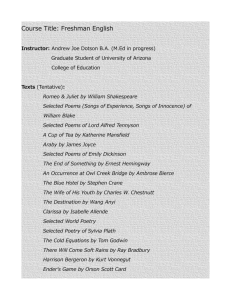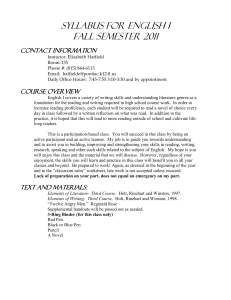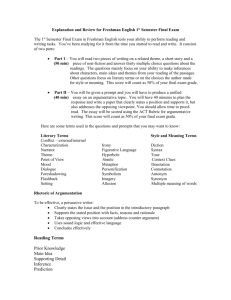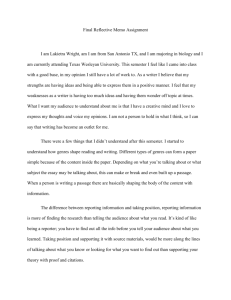IB English A Literature Syllabus Juniors 2014
advertisement
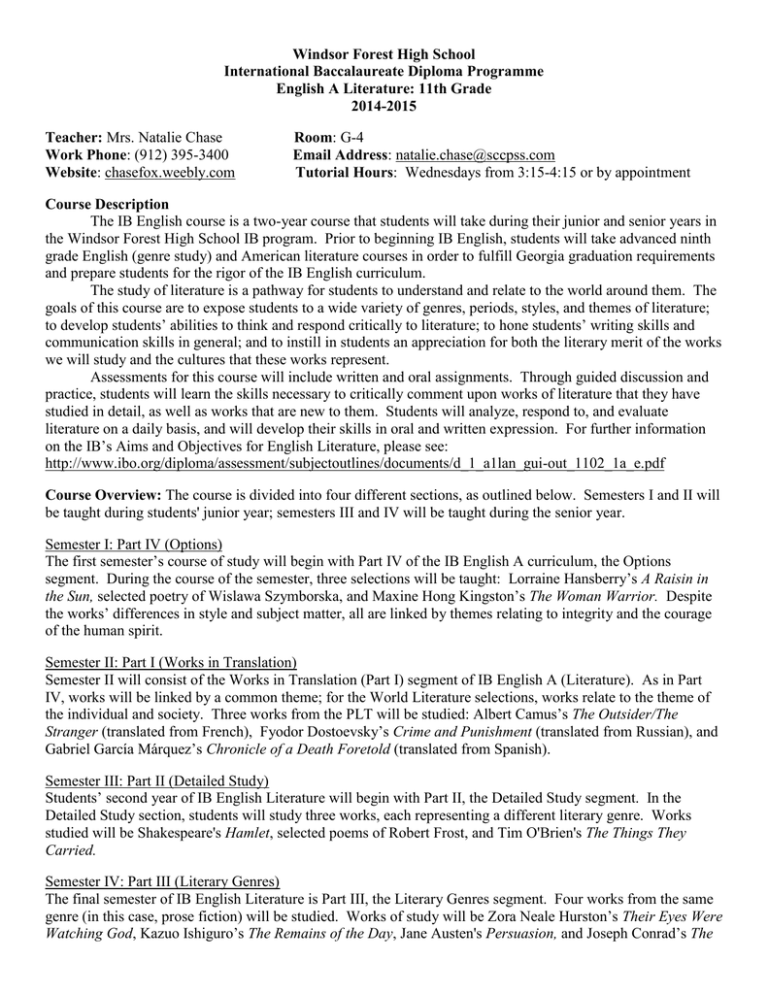
Windsor Forest High School International Baccalaureate Diploma Programme English A Literature: 11th Grade 2014-2015 Teacher: Mrs. Natalie Chase Work Phone: (912) 395-3400 Website: chasefox.weebly.com Room: G-4 Email Address: natalie.chase@sccpss.com Tutorial Hours: Wednesdays from 3:15-4:15 or by appointment Course Description The IB English course is a two-year course that students will take during their junior and senior years in the Windsor Forest High School IB program. Prior to beginning IB English, students will take advanced ninth grade English (genre study) and American literature courses in order to fulfill Georgia graduation requirements and prepare students for the rigor of the IB English curriculum. The study of literature is a pathway for students to understand and relate to the world around them. The goals of this course are to expose students to a wide variety of genres, periods, styles, and themes of literature; to develop students’ abilities to think and respond critically to literature; to hone students’ writing skills and communication skills in general; and to instill in students an appreciation for both the literary merit of the works we will study and the cultures that these works represent. Assessments for this course will include written and oral assignments. Through guided discussion and practice, students will learn the skills necessary to critically comment upon works of literature that they have studied in detail, as well as works that are new to them. Students will analyze, respond to, and evaluate literature on a daily basis, and will develop their skills in oral and written expression. For further information on the IB’s Aims and Objectives for English Literature, please see: http://www.ibo.org/diploma/assessment/subjectoutlines/documents/d_1_a1lan_gui-out_1102_1a_e.pdf Course Overview: The course is divided into four different sections, as outlined below. Semesters I and II will be taught during students' junior year; semesters III and IV will be taught during the senior year. Semester I: Part IV (Options) The first semester’s course of study will begin with Part IV of the IB English A curriculum, the Options segment. During the course of the semester, three selections will be taught: Lorraine Hansberry’s A Raisin in the Sun, selected poetry of Wislawa Szymborska, and Maxine Hong Kingston’s The Woman Warrior. Despite the works’ differences in style and subject matter, all are linked by themes relating to integrity and the courage of the human spirit. Semester II: Part I (Works in Translation) Semester II will consist of the Works in Translation (Part I) segment of IB English A (Literature). As in Part IV, works will be linked by a common theme; for the World Literature selections, works relate to the theme of the individual and society. Three works from the PLT will be studied: Albert Camus’s The Outsider/The Stranger (translated from French), Fyodor Dostoevsky’s Crime and Punishment (translated from Russian), and Gabriel García Márquez’s Chronicle of a Death Foretold (translated from Spanish). Semester III: Part II (Detailed Study) Students’ second year of IB English Literature will begin with Part II, the Detailed Study segment. In the Detailed Study section, students will study three works, each representing a different literary genre. Works studied will be Shakespeare's Hamlet, selected poems of Robert Frost, and Tim O'Brien's The Things They Carried. Semester IV: Part III (Literary Genres) The final semester of IB English Literature is Part III, the Literary Genres segment. Four works from the same genre (in this case, prose fiction) will be studied. Works of study will be Zora Neale Hurston’s Their Eyes Were Watching God, Kazuo Ishiguro’s The Remains of the Day, Jane Austen's Persuasion, and Joseph Conrad’s The Heart of Darkness. Junior Year Breakdown: Semester I: Options Texts: Hansberry’s A Raisin in the Sun Selected poems of Wislawa Szymborska Kingston's The Woman Warrior Language focus: Genre and character analysis Close reading and annotating Group and individual discussions and presentations IB Assessment: Preparation and presentation of Individual Oral Presentation (IOP) Semester II: Works in Translation Texts: Dostoevsky's Crime and Punishment Camus's The Outsider/The Stranger García Márquez’s Chronicle of a Death Foretold Language Focus: World perspectives and viewpoints, Roles of translators in literature Developing and supporting an original thesis about a work The research, writing, and revision process for longer essays IB Assessment: World Literature Papers Assessments: Students will be provided with much more detail on the IB assessments, but a brief summary is provided below. IB Internal Assessment There are two internal assessments for High Level English Literature: the Individual Oral Commentary (IOC) and the Individual Oral Presentation (IOP). The IOP assessment will be based on the works studied in the first semester (Options) of the course, and makes up 15% of students’ overall IB score. For the IOP, students will present a topic based on Part IV works. The IOC is also 15% of students’ overall IB score, and consists of a recorded commentary about a literary extract chosen by the teacher. The IOC is linked to the Detailed Study segment of the English Literature curriculum (the focus of the first half of students’ senior year). The IOC will focus on poetry studied in Part II (10 minutes), as well as a discussion based on another Part II work (also 10 minutes). IB External Assessment The external assessments for High Level English Literature are the written assignment based on a work studied in Part I (Works in Translation) and the Written Paper Component. In the spring of their junior year, students will write a reflective statement (300-400 words) and a literary essay (1,200-1,500 words) on a work studied in Part I. The written assignments linked to Part I count as 25% of the students' overall IB score. The two papers written during the spring of students' senior year will count as 50% of the IB score (25% per paper). Paper 1 is a commentary on a poetry or prose passage (2 hours). Students will be given a choice of two texts, and will respond to one. The paper will incorporate commentary on the techniques of literary criticism. Paper 2 is an essay based on works from Part III (Literary Genres). Students will select a question to analyze, basing their response on at least two works studied in Part III. Quarterly Grades Quarterly grades for students in the IB English Literature program will be based on a combination of assessments. Grades will be given for essays, homework, in-class assignments, quizzes, and tests. Assessments will be designed to measure students’ progress toward major goals of the English A course, and will focus on analyzing literature insightfully, reading and thinking critically, and writing and speaking well. Students will study vocabulary, grammar and writing skills, and supplementary literary texts along with the major works of study. Grading Breakdown Assessments (major essays, tests, quizzes): 60% Classwork/homework (summer reading, smaller writing pieces, etc.): 40% Course Rationale The course of study for WFHS’s HL English Literature includes works from a variety of genres, periods, places, and cultures. Four genres are represented: drama (Hansberry and Shakespeare), poetry (Szymborska and Frost), prose nonfiction (Kingston), and prose fiction (Hurston, Marquez, etc.). Three periods (as defined in the PBL for English A) are represented: pre-1800 (Shakespeare), 1800-1900 (Austen, Conrad), and post-1900 (Hansberry, O’Brien, etc.). The curriculum includes authors from a variety of geocultural regions, including North America, South America, and Europe, and also represents diverse ethnicities and cultures. A pivotal concept in this course will be recognizing the interrelated themes evident in works of literature, and how writers incorporate societal and global concerns into their work. Students will explore contributions and connections of writers and literary movements on the development of world literature, and will read and discuss works from a variety of cultures and perspectives. The authors of the works for this course provide us with insights into the cultures of a variety of nations (Algeria, Columbia, Russia, the United States, and England) and offer a range of perspectives within their individual cultures. The course will constantly examine the point of view of the work, the author, and the reader, and will discuss how history and circumstances can shape works of art. Internationalism will constantly be explored as students analyze, question, and critique literature from a variety of perspectives, styles, and time periods. Students will constantly be challenged to think critically, ask difficult questions, and examine the relationship between art and life. Students will write, speak, and debate the validity of their ideas on a regular basis. They will be challenged to take risks in their writing and in-class speaking, and will be challenged to broaden their perceptions of the world around them, and their own role within that world. Supplementary materials in literary criticism and history will be incorporated into the curriculum on a regular basis. The course will also draw upon key concepts and unifying principles that students discuss in other classes, such as Theory of Knowledge and the History of the Americas. Writing assignments completed for English A will serve as scaffolding for the Extended Essay, and the course will be centered on core components of IB, such as international mindedness and building well-rounded learners who aspire to meet all aspects of the learner profile. Required Materials 1. Novels, plays, and supplementary texts as assigned 2. Pen, pencil, and highlighter 3. Three-ring loose-leaf binder (1” – 1.5“) 4. Loose-leaf notebook paper 5. Assignment log, calendar, or similar method to keep track of assignments and deadlines Policy on Honesty and Plagiarism All submitted work and activities should be genuine reflections of individual achievement from which the student should derive personal satisfaction and a sense of accomplishment. Plagiarism and cheating subvert these goals and will be treated according to the policy stated in the Student Handbook. The teacher reserves the right to utilize electronic means to help prevent plagiarism.


